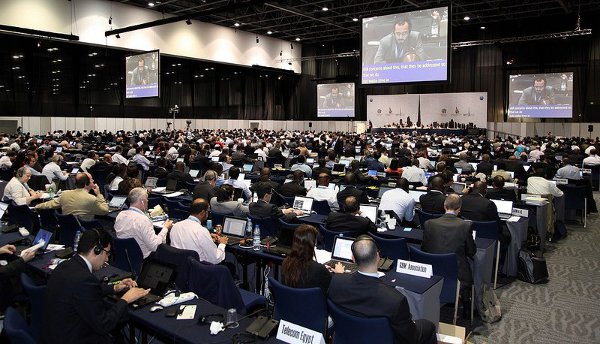In the latest from the World Conference on International Telecommunications (WCIT 2012) in Dubai, the US, Canada, and the UK have refused signing a proposed treaty that would give equal governing rights to world states.
 Courtesy ITU Facebook
Courtesy ITU FacebookAs we reported earlier, Russia, China, and Saudi Arabia set out to push for dramatic changes to be made to Internet governance from the beginning of the WCIT Dubai event. And, at the other end of the spectrum, US and European influences, even Google and other corporations, diametrically oppose any regulatory role for the ITU. Formerly charged with regulating aspects of mobile and other telecommunications (for decades), ITU was suggested as another inter regulatory agency to govern Internet rules. At least some member states wanted some individual country oversight via the United Nations agency.
While decision makers at the International Telecommunication Union (ITU) claimed a consensus on these issues was possible this week, it seems clear now not even compromise is possible where the US, Canada, and the UK are concerned. The conference winds down today with representatives from countries from Denmark to New Zealand consulting home offices to determine each’s signing status for today.
The 12 day conference organized by the ITU has been virtually assailed in the West over claims any new treaty would lead to censorship of the web from some states. One author, ZDNet’s David Gewirtz, went so far as to accuse the ITU of skulduggery without the slightest evidence of same. It’s clear to this write that just saying it is so is the equivalent of truth for some. Perhaps what should concern interested readers is the one sided reporting and lobbying going on across the web.
Gewirtz’s piece, references a Weekly Standard piece, which basically references key opponent Accessnow.org’s position on what really was a late day survey by the ITU to determine Friday’s (today’s) course and to see where delegates stand on issues. According to most reports, In all honesty, the Weekly Standard’s report is overloaded with Accessnow links, the significance of which is that this organization’s board is chock full of corporate Internet celebrities from Google and elsewhere.
A sub-headline at B & C Mobile encapsulates a huge problem opponents of ITU regulatory oversight have. While the union leadership can be cast as the “bad guys” out of their association with “the establishment”, or governmental oversight, the other side of this argument is headed by none other than the corporate controlling elements of the WWW. While no one so far has pointed out the obvious, the following points to what this “battle” over “freedoms” is more about:
“Computer and Web companies were seeing red Thursday after what they saw as an Internet power grab in Dubai”
According to this article via Broadcast and Cable, The Computer & Communications Industry Association (CCIA) is livid over a so-called “power grab” attempt last night by the ITU. It should interest the reader to know that CCIA is not a consumer advocacy non-profit, but a corporate membership organization whose membership includes the likes of Google, Yahoo!, Microsoft, and so on. Their stated purpose is to, in part:
“…be highly responsive to our members’ needs, assessing and shaping legislative and regulatory activity in collaboration with executives from member companies. CCIA strives for a detailed understanding of the business operations for our members. Such understanding is vital in translating their technology, business, and policy needs into action.”
It’s fair to suggest that the spear tip of controversy in Dubai is jabbing, not at freedom for users and reduced controls of the Internet, but rather positioning just “who” actually does control. This is not even at the level of subterfuge, both sides are operating in broad daylight. On the one hand we have a United Nations and governments wanting to run the Internet, and on the other we have the companies that run the Internet. In the middle are the people who pay for it.



